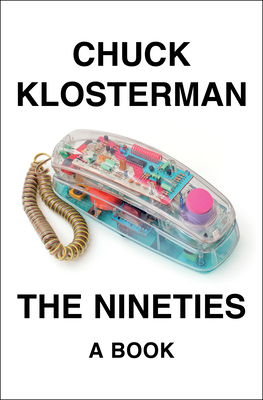 The Nineties By Chuck Klosterman
The Nineties By Chuck Klosterman Source Purchased
Published by Penguin Press on February 8, 2022
Rating:

It was long ago, but not as long as it seems: The Berlin Wall fell and the Twin Towers collapsed. In between, one presidential election was allegedly decided by Ross Perot while another was plausibly decided by Ralph Nader. In the beginning, almost every name and address was listed in a phone book, and everyone answered their landlines because you didn't know who it was. By the end, exposing someone's address was an act of emotional violence, and nobody picked up their new cell phone if they didn't know who it was. The '90s brought about a revolution in the human condition we're still groping to understand. Happily, Chuck Klosterman is more than up to the job.
Beyond epiphenomena like Cop Killer and Titanic and Zima, there were wholesale shifts in how society was perceived: the rise of the internet, pre-9/11 politics, and the paradoxical belief that nothing was more humiliating than trying too hard. Pop culture accelerated without the aid of a machine that remembered everything, generating an odd comfort in never being certain about anything. On a '90s Thursday night, more people watched any random episode of Seinfeld than the finale of Game of Thrones. But nobody thought that was important; if you missed it, you simply missed it. It was the last era that held to the idea of a true, hegemonic mainstream before it all began to fracture, whether you found a home in it or defined yourself against it.
In The Nineties, Chuck Klosterman makes a home in all of it: the film, the music, the sports, the TV, the politics, the changes regarding race and class and sexuality, the yin/yang of Oprah and Alan Greenspan. In perhaps no other book ever written would a sentence like, "The video for 'Smells Like Teen Spirit' was not more consequential than the reunification of Germany" make complete sense. Chuck Klosterman has written a multi-dimensional masterpiece, a work of synthesis so smart and delightful that future historians might well refer to this entire period as Klostermanian.
I grew up in the 90s. I love 90s nostalgia. I love reading about the 90s pop culture, fashion, and beauty trends. So a book of essays about the 90s seemed totally up my alley.
For the most part, I enjoyed this. I like the way Chuck Klosterman weaves seemingly-disparate things together, but I was mainly interested in pop culture. The chapters that were heavy on politics interested me much less (maybe partly because I’m not an American. If I was, I might have gotten more out of those). The chapters are quite dense and I genuinely enjoyed reading several of them, but I was surprised at how dry the book is. I guess I thought there would be a bit more whimsy.
And as others have pointed out, the book is written from a white male middle perspective, so while it may be a look at the nineties as the author views the decade through that narrow lens, it isn’t necessarily an entirely accurate representation (nor is it a perspective we have been lacking).
I took my time reading this, going for small doses rather than non-stop reading the book, and as I said, several of the chapters covered topics that interested me (particularly when Klosterman wrote about baseball, Michael Jordan, and the internet and Google). But his writing irked me at times. This is the first time I’ve read any of Klosterman’s writing, so I don’t know if it’s a quirk of his writing or unique to this book, but I was annoyed at how often he would write that something was or wasn’t important / popular / etc. only to immediately paranthetically contradict what he wrote. It was so flippant and constant throughout the book.
So The Nineties was often as interesting as it was frustrating to read.














2 Responses
I rate this review 5 Dreams of the 90’s Still Alive in Portland out of 5.
😂😂😂